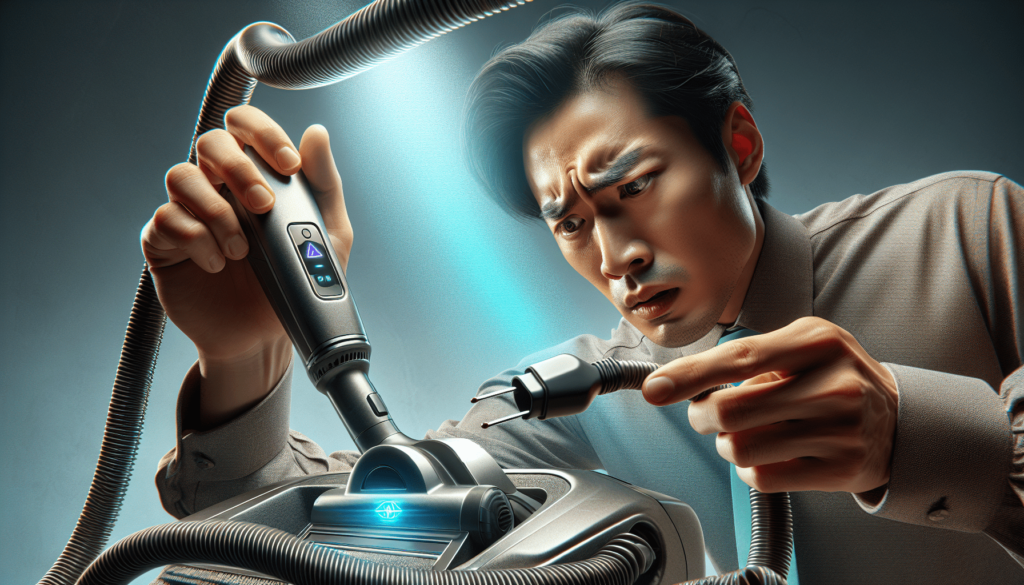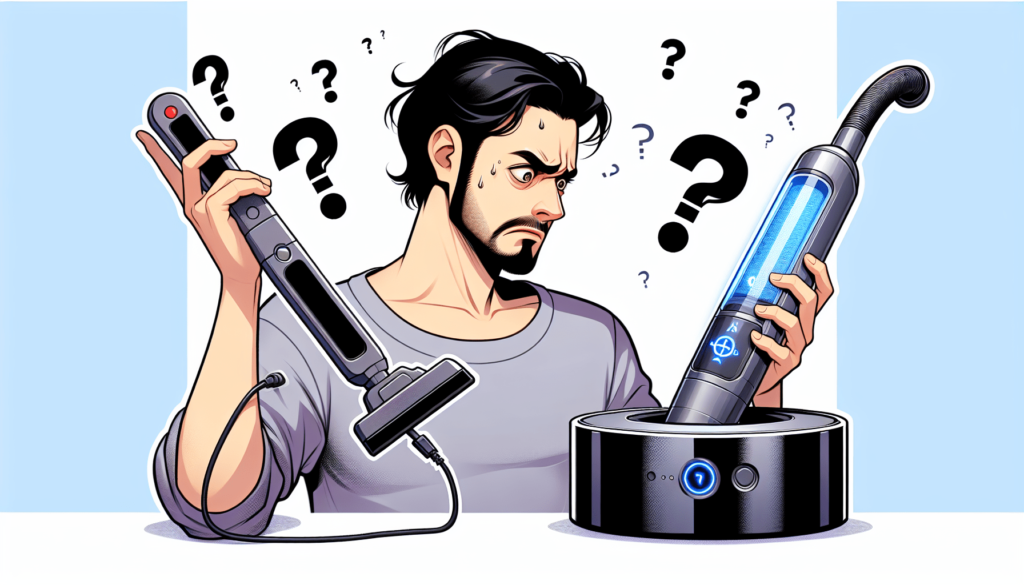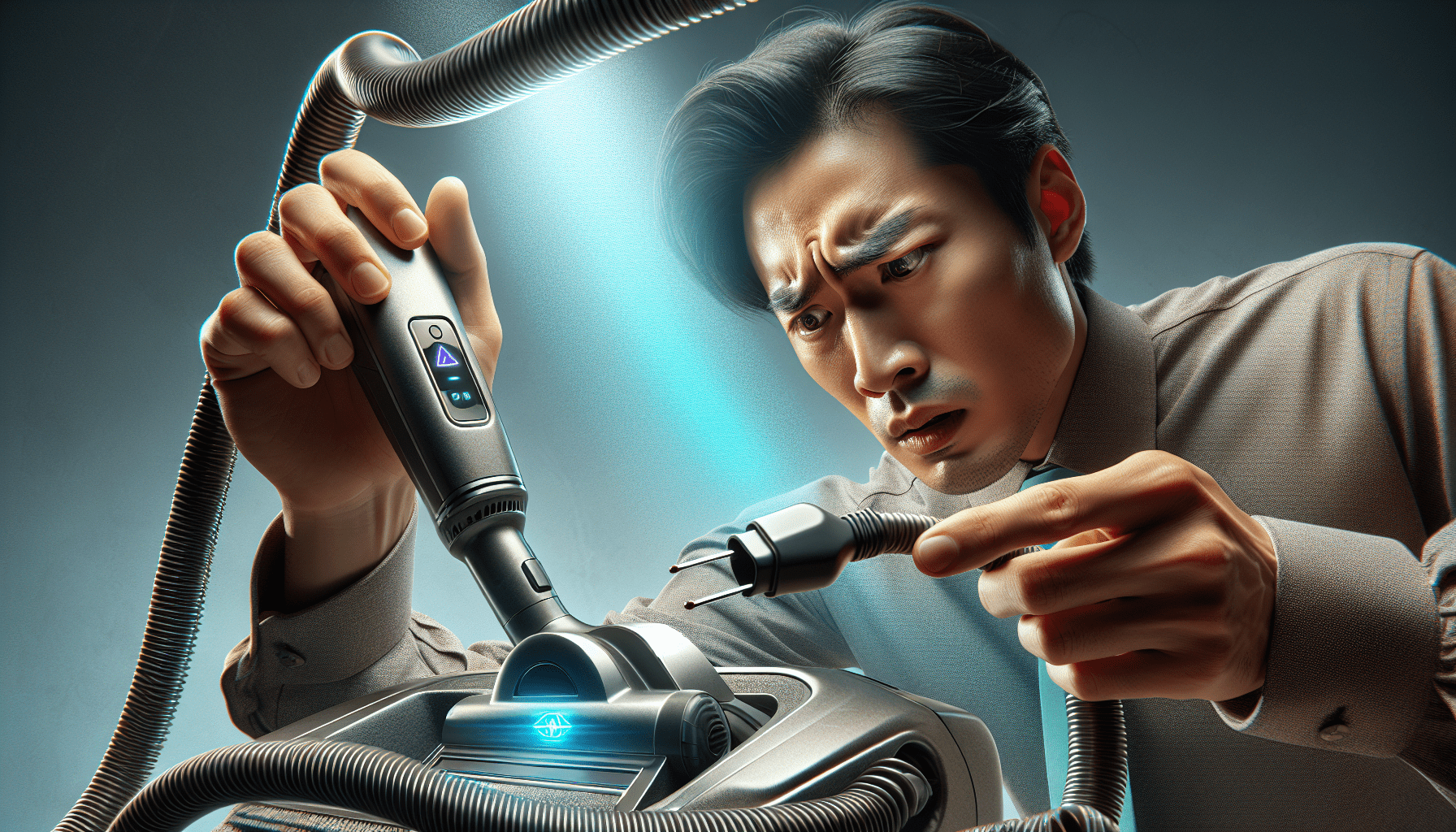Having trouble with your Dyson vacuum not charging? Don’t worry, we’ve got you covered! In this article, we will guide you through understanding the blue light indicator on your Dyson vacuum and provide troubleshooting tips to help you get your vacuum up and running again. So, if you’re tired of dealing with a vacuum that won’t charge, sit back, relax, and let us help you solve the problem!

Understanding the Blue Light Indicator
Introduction to the blue light indicator
When it comes to charging your Dyson vacuum, you may have noticed a blue light indicator. This blue light serves as an important signal that can provide valuable insights about the charging status of your vacuum. Understanding the meaning behind the blue light and its importance for charging is essential for keeping your Dyson vacuum running smoothly.
Meaning of the blue light
The blue light on your Dyson vacuum indicates that the device is currently charging. It is a way for the vacuum to communicate with you and let you know that the battery is being replenished. This light is a visual cue that you can rely on to understand the charging progress of your vacuum. By paying attention to the blue light, you can easily determine if your Dyson vacuum is receiving the necessary power it needs to operate effectively.
Importance of the blue light for charging
The blue light indicator plays a vital role in ensuring that your Dyson vacuum is being charged properly. When the blue light is solid and constant, it means that the vacuum is actively charging. This is an indication that everything is working correctly. On the other hand, if the blue light is flashing or not present at all, it suggests that there may be an issue with the charging process. Understanding the significance of the blue light will empower you to troubleshoot and resolve any charging problems that may arise.
Possible Reasons for Dyson Vacuum Not Charging
Battery issues
One of the most common reasons for a Dyson vacuum not charging is a battery problem. Over time, the battery may start to degrade, leading to issues with charging. If the battery fails or is no longer able to hold a charge, it may need to be replaced.
Power supply problems
Another possible culprit for a Dyson vacuum not charging is a problem with the power supply. Ensure that the power outlet you are using is functioning correctly and providing the necessary power. It is also recommended to try a different power outlet to rule out any issues with the original one.
Dirty contacts
Dirty contacts can hinder the charging process by creating a barrier between the charging cable and the vacuum’s battery. If the contacts are covered in dust or dirt, the connection may be compromised. Regularly cleaning the charging contacts can help ensure a proper and uninterrupted charging experience.
Faulty charging cable
A faulty charging cable can greatly impact the charging performance of your Dyson vacuum. Check the cable for any signs of wear and tear, frayed wires, or loose connections. If the charging cable is damaged, it should be replaced with a new one to restore proper charging functionality.
Defective charger
The charger itself may be the root cause of the charging problem. A defective charger can prevent your Dyson vacuum from charging successfully. To determine if the charger is the issue, try using a different charger that is compatible with your vacuum model.
Obstruction in the charging port
Sometimes, debris or foreign objects can find their way into the charging port of your Dyson vacuum, obstructing the charging process. Carefully inspect the charging port and remove any obstructions that may be present. By ensuring a clear and unobstructed pathway, you can avoid charging issues caused by blockages.
Troubleshooting Steps
To resolve the issue of your Dyson vacuum not charging, you can follow a series of troubleshooting steps. These steps will help identify potential problems and guide you towards a solution.
Check the battery status
Begin by checking the battery status of your Dyson vacuum. Ensure that the battery is properly inserted and securely connected. If needed, clean the battery contacts and reinsert the battery to establish a good connection.
Inspect the power supply
Verify that the power outlet you are using is working correctly. Plug in another device to confirm that power is being provided. If necessary, try a different power outlet to ensure that the current outlet is not the source of the charging problem.
Clean the charging contacts
Take a soft, lint-free cloth and gently clean the charging contacts on both the vacuum and the charging cable. Ensure that there is no dirt, dust, or residue on the contacts that may interfere with the charging process.
Test the charging cable
If you suspect that the charging cable may be faulty, try using a different cable that is compatible with your Dyson vacuum. This will help determine if the original cable is causing the charging problem.
Try a different charger
In addition to trying a different charging cable, consider using a different charger altogether. If you have access to another charger that is compatible with your Dyson vacuum, use it to test if the original charger is defective.
Clear any obstructions in the charging port
Inspect the charging port of your Dyson vacuum for any obstructions or debris. If you find any, carefully remove them using a non-metallic tool, such as a toothpick or a cotton swab. Be gentle to avoid causing any damage to the charging port.
Reset the vacuum
If none of the previous troubleshooting steps resolve the charging issue, try resetting your Dyson vacuum. Refer to the user manual or Dyson website for instructions on how to perform a factory reset. This may help reset any internal system glitches that could be affecting the charging process.
Detailed Troubleshooting Steps
Check battery connections
Ensure that the battery is properly seated in the vacuum and securely connected. If needed, clean the battery contacts using a soft, lint-free cloth.
Inspect battery condition
Examine the battery for any signs of physical damage or degradation. If the battery appears damaged or is no longer holding a charge, it may need to be replaced.
Verify power outlet
Plug another device into the same power outlet to confirm that it is working. If the outlet is not providing power, try a different outlet in a different location.
Test power cable
If possible, test the power cable with another device to ensure that it is working correctly. Look for any signs of damage such as frayed wires or loose connections.
Clean charging contacts
Gently clean the charging contacts on the vacuum and the charging cable using a soft, lint-free cloth. Ensure that there is no debris or residue obstructing the connection.
Replace charging cable
If the charging cable appears damaged or is not working, replace it with a new one that is compatible with your Dyson vacuum model.
Replace charger
If using a different charging cable does not resolve the issue, the charger itself may be defective. Obtain a new charger that is specifically designed for your Dyson vacuum model.
Remove obstructions from charging port
Inspect the charging port for any debris or obstructions. Carefully remove any foreign objects using a non-metallic tool, making sure not to damage the charging port.
Perform a factory reset
If all other troubleshooting steps fail, try performing a factory reset on your Dyson vacuum. Follow the instructions provided in the user manual or visit the Dyson website for specific steps on how to reset your model.

Warning Signs and Indications
Flashing blue light
If you notice that the blue light on your Dyson vacuum is flashing, it may indicate a charging problem. A flashing blue light typically suggests that the vacuum is not receiving a consistent charge.
No light when plugged in
If there is no light at all when you plug in your Dyson vacuum, it could mean that the power supply is not reaching the device. This lack of light may indicate a more significant charging issue that needs to be addressed.
Intermittent charging
If your Dyson vacuum charges inconsistently, with the blue light appearing and disappearing, it may be a sign that there is an underlying issue affecting the charging process. This can lead to a frustrating charging experience and can impact the overall performance of your vacuum.
Overheating
If your Dyson vacuum becomes hot to the touch while charging, it may be experiencing overheating. Overheating can be dangerous for both the vacuum and its surroundings. If you notice excessive heat during the charging process, it is important to address the issue promptly to prevent any potential damage.
Replacement Parts and Accessories
Battery replacement
If your Dyson vacuum’s battery is no longer holding a charge or is not functioning correctly, it may be necessary to replace the battery. Consult the Dyson website or contact their customer support for information on where to purchase a genuine replacement battery.
Charging cable replacement
Should you determine that the charging cable is the cause of your Dyson vacuum not charging, you can purchase a new charging cable from Dyson or authorized retailers. Ensure that the replacement cable is compatible with your specific vacuum model.
Charger replacement
If the charger is identified as the culprit for the charging issue, it may be necessary to obtain a new charger. Contact Dyson customer support or refer to their website for guidance on purchasing a genuine replacement charger.
Contacting Dyson Support
Exploring online resources
Dyson provides a wealth of online resources to assist customers in troubleshooting charging issues. Visit their website and browse through their support section, which includes frequently asked questions, user manuals, and instructional videos. These resources can provide useful insights and step-by-step instructions to help you resolve your Dyson vacuum charging problems.
Contacting customer support
If you have exhausted all troubleshooting options and are still experiencing charging issues with your Dyson vacuum, it is recommended to contact Dyson’s customer support directly. Their knowledgeable and friendly support team will be able to provide guidance tailored to your specific situation and help you find a solution.
Preventive Measures
Regularly clean charging contacts
To prevent future charging issues, it is important to regularly clean the charging contacts on both the vacuum and the charging cable. Use a soft, lint-free cloth to remove any dirt or debris that may accumulate over time.
Ensure proper storage and handling
Properly storing and handling your Dyson vacuum can contribute to its overall performance and charging capabilities. Avoid exposing the vacuum to extreme temperatures or harsh conditions that may damage the battery or charging components.
Use compatible charging accessories
Using compatible charging accessories, such as charging cables and chargers specifically designed for your Dyson vacuum model, is essential to ensure optimal charging performance. Non-compatible accessories may not provide the correct voltage or connection, leading to charging problems.
When to Seek Professional Help
Persistent charging issues
If you have followed all the troubleshooting steps provided and are still encountering consistent charging problems with your Dyson vacuum, it may be time to seek professional help. Contact Dyson customer support or bring your vacuum to an authorized service center for further diagnosis and repair.
Internal component failures
Internal component failures, while not common, can cause charging issues in Dyson vacuums. If you suspect that internal components may be the cause of the problem and are beyond your ability to repair, it is advisable to have your vacuum inspected by a qualified professional.
Conclusion
Troubleshooting charging issues with your Dyson vacuum is a step-by-step process that involves checking various components and connections. By understanding the meaning of the blue light indicator and following the outlined troubleshooting steps, you can effectively diagnose and resolve charging problems. Remember to take preventive measures, regularly clean the charging contacts, and use compatible accessories to ensure the long-term performance of your Dyson vacuum.


